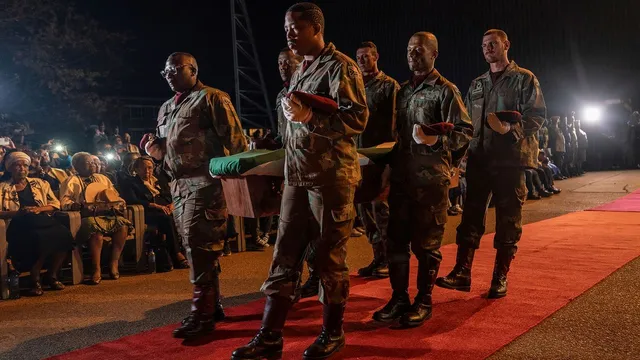
Remains of 49 South African freedom fighters returned from Zimbabwe and Zambia
2024-09-25 17:58- The remains of 42 freedom fighters were returned to South Africa from Zimbabwe and Zambia.
- This repatriation is part of a government initiative to provide closure to families of those who died in exile.
- A homecoming ceremony is planned, highlighting the importance of remembering the sacrifices made during the anti-apartheid struggle.
Express your sentiment!
Insights
The remains of 42 South African freedom fighters, who perished in exile during the anti-apartheid struggle, were repatriated from Zimbabwe and Zambia on a Wednesday. This initiative, part of a government program, aims to provide closure to families whose loved ones died far from home while fighting against white minority rule. The remains were received at the Waterkloof Air Force Base in Pretoria by government officials and family members, marking a significant moment in the nation's history. Many activists left South Africa to avoid arrest or to receive military training, with Zimbabwe and Zambia serving as key locations for the African National Congress and Pan Africanist Congress. The repatriation included notable figures such as Duma Nokwe, Florence Mophosho, and Basil February, who played vital roles in the struggle. The government is also working on repatriating remains from other countries, including Lesotho and Ethiopia. Deputy President Paul Mashatile emphasized the importance of this repatriation as part of a national memory project, which seeks to educate future generations about the sacrifices made during the fight against apartheid. The initiative aims to commemorate and preserve the legacy of those who fought for freedom, ensuring their contributions are not forgotten. A homecoming ceremony hosted by President Cyril Ramaphosa is scheduled for Friday, where the remains will be handed over to families for reburial. This event symbolizes a step towards healing and recognition of the struggles faced by many South Africans during the apartheid era.
Contexts
The remains of 49 South African freedom fighters have been returned from Zimbabwe and Zambia, highlighting the ongoing efforts to honor those who fought against apartheid. This return comes amid various regional challenges, including a severe drought in Zimbabwe that has led to food shortages and prompted the government to propose culling elephants to support vulnerable communities. Such measures have drawn criticism from conservationists concerned about wildlife protection. In South Africa, political tensions are evident as Mlungisi Makhanya, an opposition leader from Eswatini, was poisoned in Pretoria, raising alarms about the safety of exiled activists. This incident occurred ahead of planned pro-democracy protests, reflecting the volatile political climate in the region. Additionally, Zambia's President Hakainde Hichilema has suspended judges over alleged misconduct related to the 2016 presidential election, further complicating the political landscape. This decision has sparked criticism and concerns about judicial independence, indicating the ongoing struggles within the region's governance. These events underscore the complex interplay of political, social, and environmental issues in Southern Africa, as the return of the freedom fighters' remains serves as a poignant reminder of the sacrifices made in the fight for freedom and justice.